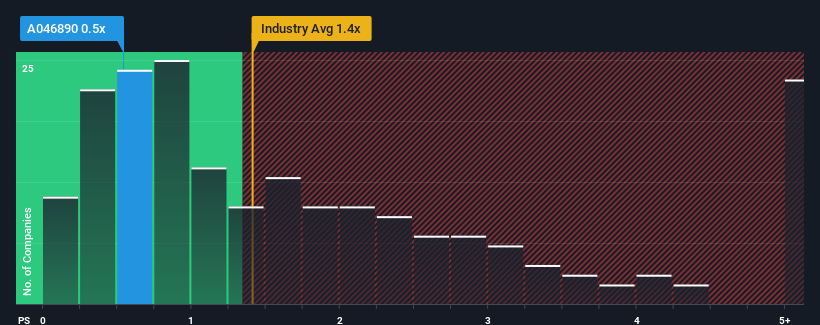Why Investors Shouldn't Be Surprised By Seoul Semiconductor Co., Ltd.'s (KOSDAQ:046890) Low P/S
When close to half the companies operating in the Semiconductor industry in Korea have price-to-sales ratios (or "P/S") above 1.4x, you may consider Seoul Semiconductor Co., Ltd. (KOSDAQ:046890) as an attractive investment with its 0.5x P/S ratio. Nonetheless, we'd need to dig a little deeper to determine if there is a rational basis for the reduced P/S.
See our latest analysis for Seoul Semiconductor

What Does Seoul Semiconductor's P/S Mean For Shareholders?
Recent times haven't been great for Seoul Semiconductor as its revenue has been rising slower than most other companies. The P/S ratio is probably low because investors think this lacklustre revenue performance isn't going to get any better. If this is the case, then existing shareholders will probably struggle to get excited about the future direction of the share price.
Want the full picture on analyst estimates for the company? Then our free report on Seoul Semiconductor will help you uncover what's on the horizon.Is There Any Revenue Growth Forecasted For Seoul Semiconductor?
There's an inherent assumption that a company should underperform the industry for P/S ratios like Seoul Semiconductor's to be considered reasonable.
Taking a look back first, we see that the company managed to grow revenues by a handy 6.8% last year. However, this wasn't enough as the latest three year period has seen an unpleasant 16% overall drop in revenue. Accordingly, shareholders would have felt downbeat about the medium-term rates of revenue growth.
Shifting to the future, estimates from the five analysts covering the company suggest revenue should grow by 2.2% over the next year. That's shaping up to be materially lower than the 65% growth forecast for the broader industry.
With this in consideration, its clear as to why Seoul Semiconductor's P/S is falling short industry peers. Apparently many shareholders weren't comfortable holding on while the company is potentially eyeing a less prosperous future.
What We Can Learn From Seoul Semiconductor's P/S?
Typically, we'd caution against reading too much into price-to-sales ratios when settling on investment decisions, though it can reveal plenty about what other market participants think about the company.
As expected, our analysis of Seoul Semiconductor's analyst forecasts confirms that the company's underwhelming revenue outlook is a major contributor to its low P/S. Shareholders' pessimism on the revenue prospects for the company seems to be the main contributor to the depressed P/S. Unless these conditions improve, they will continue to form a barrier for the share price around these levels.
Before you take the next step, you should know about the 1 warning sign for Seoul Semiconductor that we have uncovered.
If these risks are making you reconsider your opinion on Seoul Semiconductor, explore our interactive list of high quality stocks to get an idea of what else is out there.
Have feedback on this article? Concerned about the content? Get in touch with us directly. Alternatively, email editorial-team (at) simplywallst.com.
This article by Simply Wall St is general in nature. We provide commentary based on historical data and analyst forecasts only using an unbiased methodology and our articles are not intended to be financial advice. It does not constitute a recommendation to buy or sell any stock, and does not take account of your objectives, or your financial situation. We aim to bring you long-term focused analysis driven by fundamental data. Note that our analysis may not factor in the latest price-sensitive company announcements or qualitative material. Simply Wall St has no position in any stocks mentioned.
 Index Options
Index Options CME Group
CME Group Nasdaq
Nasdaq Cboe
Cboe TradingView
TradingView Wall Street Journal
Wall Street Journal